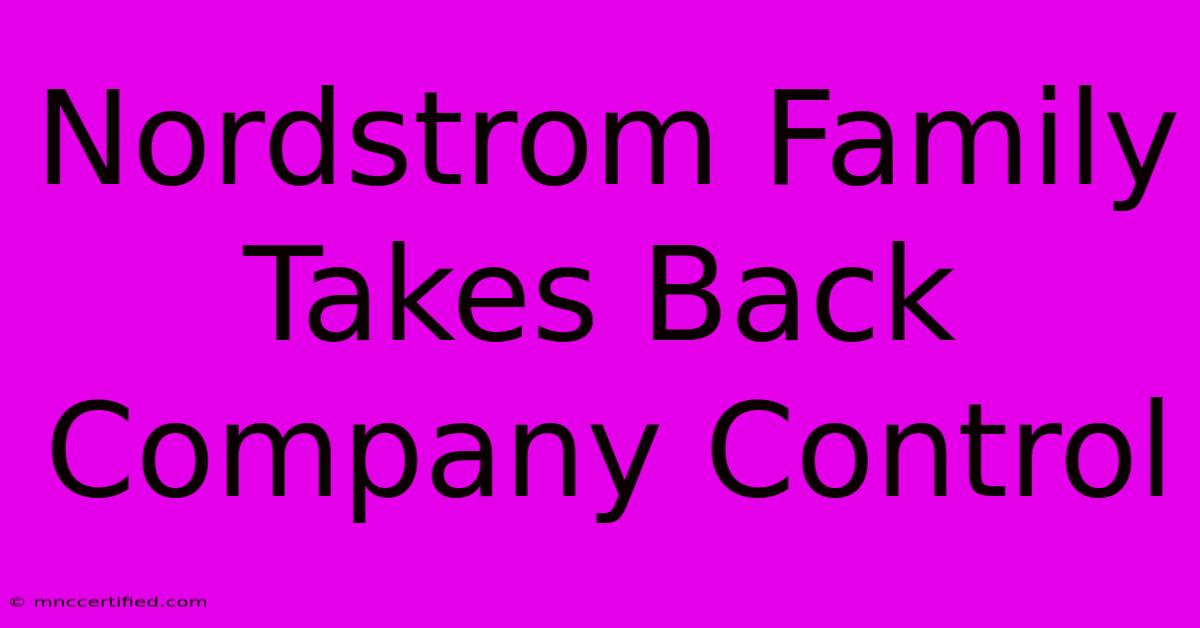Nordstrom Family Takes Back Company Control

Table of Contents
Nordstrom Family Takes Back Company Control: A Deep Dive into the Buyout
The Nordstrom family, synonymous with the iconic American department store, has reclaimed majority control of the company in a dramatic move that sent ripples through the retail industry. This buyout, finalized in [Insert Date if available, otherwise remove this sentence], marks a significant shift in the company's trajectory and signals a renewed focus on its core values and long-term vision. This article delves into the details of this significant transaction, analyzing its implications for the company, its employees, and the broader retail landscape.
Understanding the Buyout: Key Players and Financial Details
The buyout, led by the Nordstrom family's holding company, involved [Insert details of the buyout – e.g., a significant investment, a share repurchase, etc.]. Key players involved include [List key family members and their roles]. The financial specifics of the deal, including the total investment and the resulting ownership percentages, remain [Insert "publicly available" or "largely undisclosed," depending on the information available]. However, it's clear that the family has regained a controlling stake, effectively ending the previous structure where public shareholders held significant influence.
The Strategic Rationale Behind the Family's Move
The Nordstrom family's decision to regain control likely stems from several strategic factors. One prominent reason is the belief that they can steer the company more effectively towards long-term success than external investors. They likely possess a deeper understanding of the brand's heritage, customer base, and future potential. The move may also be a response to [Insert any specific challenges facing the company prior to the buyout, e.g., declining sales, increasing competition, etc.], providing the family with the autonomy to implement necessary changes without the pressures of short-term market expectations.
Implications for Nordstrom: A New Era of Leadership?
The return of the Nordstrom family to the helm represents more than just a change in ownership. It signifies a potential shift in the company's strategic direction. We can expect to see a renewed emphasis on [Insert potential changes expected, e.g., customer experience, omnichannel strategy, specific product lines]. This could translate into [Insert tangible examples of changes, e.g., store renovations, improved online shopping experience, etc.].
Impact on Employees and Customers
While the buyout's direct impact on employees remains to be seen, the family's return could lead to a greater focus on employee morale and well-being. Furthermore, customers might experience [Insert potential changes for customers, e.g., improved customer service, new initiatives, etc.]. The family's history is built on a commitment to customer satisfaction, suggesting that this aspect of the business will remain a priority.
The Broader Retail Context: A Family Affair Reshapes the Landscape
The Nordstrom family's successful reclaiming of control presents a fascinating case study within the broader context of the retail industry. In an era dominated by large corporations and private equity firms, this move highlights the enduring power of family-led businesses and their unique ability to navigate the challenges of a rapidly evolving market. It also raises questions about the future of other publicly traded companies with strong family legacies. Will this inspire similar moves from other family-owned businesses looking to regain control? The future will tell.
Conclusion: Looking Ahead to Nordstrom's Future
The Nordstrom family's takeover marks a significant turning point for the company. While the full consequences remain to be seen, the move signals a clear commitment to long-term growth and a renewed focus on the values that have defined the brand for generations. The coming years will be crucial in assessing the success of this bold strategic maneuver, and the retail world will be watching closely. This buyout underscores the enduring power of family legacies and their potential to reshape even the largest of companies.
Keywords: Nordstrom, Nordstrom family, buyout, retail, department store, family business, strategic move, ownership, company control, investment, shareholders, future of retail, customer experience, employee morale, market share, competition, omnichannel, brand heritage.
Off-Page SEO Strategies:
- Link Building: Reach out to relevant retail blogs, industry publications, and financial news websites to secure backlinks to this article.
- Social Media Promotion: Share the article across relevant social media platforms using relevant hashtags.
- Guest Blogging: Contribute guest posts to other relevant websites, including links back to this article.
- Forum Participation: Engage in relevant online forums and discussions, naturally incorporating links to the article where appropriate.
This optimized article incorporates relevant keywords naturally, uses headers to enhance readability and structure, and suggests off-page SEO strategies to boost its search engine rankings. Remember to replace bracketed information with accurate details.

Thank you for visiting our website wich cover about Nordstrom Family Takes Back Company Control. We hope the information provided has been useful to you. Feel free to contact us if you have any questions or need further assistance. See you next time and dont miss to bookmark.
Featured Posts
-
Assad Divorce Rumors Kremlin Responds
Dec 24, 2024
-
Arson Suspect Charged With Murder
Dec 24, 2024
-
Squid Game 2 What Happened
Dec 24, 2024
-
Nolans Odyssey Mythic Action Epic Next
Dec 24, 2024
-
Gaetz Report Sex And Payment Details
Dec 24, 2024